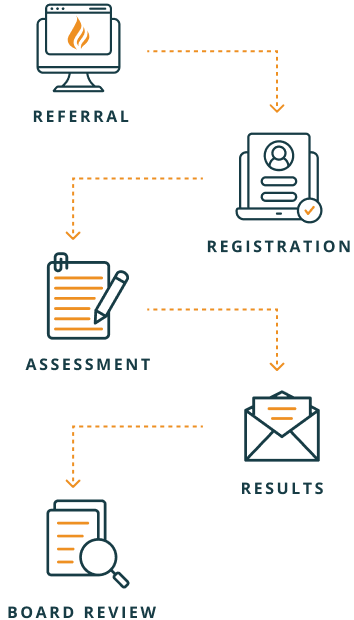Schedule Your
EBAS Assessments
In a few clicks, you’ll be ready to take your
EBAS evaluation at a local testing center.
About EBAS Assessments
Our written assessments give you the chance to demonstrate your ethical reasoning and decision-making skills — a key step on the path back to practicing.
Format
Each assessment is open-ended and essay-based.
Time
You will have 60 minutes to complete each assessment.
Pricing
Each EBAS assessment costs $400.
Location
You’ll take your assessments at a local Prometric testing center.
Process
After your assessment, results are sent to you in 5–7 business days.

How the EBAS Assessment Process Works
- Referral: Your board (or legal counsel) directs you to complete EBAS.
- Registration: Register for your assessment and receive details on timing, location, and more.
- Assessment: you’ll be asked to think through a hypothetical scenario and write down how you would approach it.
- Results: Once completed, you’ll learn whether you passed or failed within 5-7 business days.
- Board Review: Your referring organization will review your results and communicate with you on next steps.

FAQs on EBAS Assessments
Get answers to commonly asked questions below.
EBAS assessments evaluate how you think, not what you know, so there is no study guide. To get a feel for what the assessment will involve, please review this sample assessment.
We encourage you to arrive at the testing center early, with all of the required materials, to ensure a smooth check-in and testing process.
If you don’t pass, your referring organization will discuss next steps with you. You are allowed to re-take your EBAS assessment, should your referring organization require it.
Each EBAS section (Fraud, Boundaries, Professional Standards, Unprofessional Conduct, Substance Abuse) has a 60-minute time limit. If multiple assessments are required, you may schedule them back-to-back or separately. After three consecutive assessments, a 15-minute break is provided. Please also allow extra time for travel to your Prometric test center and check-in.
Your assessment will be proctored at a Prometric testing center in your community. You’ll receive the details when you register.
After your assessment, results are sent within 5–7 business days. If your assessment was referred by a board, results go to both you and the referring organization. If you scheduled the assessment yourself, results go only to you.
Yes. While most assessments are board-referred, you may also register proactively. Some licensees choose to do this before a disciplinary order is issued, so their results are available to share with their board or legal counsel if needed. During registration, select your profession and state, then choose “Self Only – No Licensing Board Requirement.” Results from proactive assessments are sent only to you.
Applicants can cancel or reschedule their exam with Prometric up to five days before their scheduled appointment. Prometric does not allow changes within the five-day window. A $50 fee per essay applies to rescheduling or canceling appointments made five to 29 days before the scheduled date. To reschedule, please contact Admin@Ebas.org with your confirmation number.
Explore Helpful Resources for Licensees
Explore materials created to help professionals understand the EBAS process, what to expect,
and how to approach the assessment experience confidently.

Jan 12th, 2026
Guidelines for EBAS Assessment Preparation
The EBAS assessment evaluates ethical reasoning and professional judgment.
Read More

Oct 13th, 2025
Inside the EBAS Assessment Process
An overview of each assessment stage, from setup to scoring, so participants know what to expect.
Read More

Jul 14th, 2025
EBAS Sample Assessment and Rubric
How EBAS evaluates ethical reasoning through structured prompts and consistent scoring.
Read More

Jun 16th, 2025
What to Expect When Taking the Assessment
A guide to registration, test-day steps, assessment format, and next steps.
Read More
Ready to Register?
Tap the button below to get started. With any questions, please contact admin@ebas.org and we’ll get back to you promptly. Thank you!

